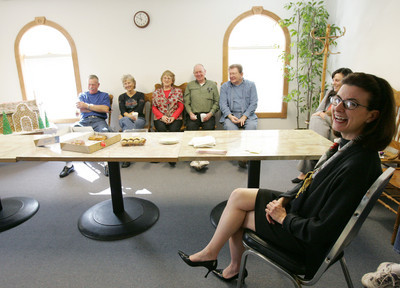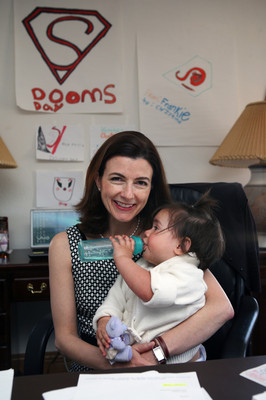A turnaround for the best
It's a major business-success story.
Since 2005, net assets have jumped 29 percent, from $9.2 million to $12.9 million. After four straight years in the red, there's now a $1.5 million surplus. The enterprise has its first rainy-day reserve account, larded with $400,000, to get it through leaner times outside its traditional Christmas income surge. And, a new merit-pay system is encouraging staff members to exceed expectations.
There's just one catch: This turnaround masterpiece wasn't executed at a business.
It happened at St. Jude's Ranch, a Nevada-based nonprofit that maintains campuses in Boulder City and Bulverde, Texas. The 41-year-old ranch takes in abused, abandoned and neglected children, with an eye toward healing, nurturing and teaching life skills.
The organization hit hard times after losing donor dollars to charities focused on victims of the terrorist attacks on Sept. 11, 2001, as well as survivors of the Asian tsunami of 2004. Its supporters had a unique solution to the ranch's woes -- retain consultant Christine Spadafor, a Harvard-educated attorney and turnaround expert in Boston, Mass., to craft a survival plan.
The effort at St. Jude's is part of a broader move among charities toward embracing best business principles and practices. The idea is to use corporate-world concepts such as accountability and return on investment to bolster nonprofits' ability to serve their constituents.
"A not-for-profit isn't looking just to break even," said Robert Kolesar Jr., vice president of commercial sales for Nevada Title Co. and a trustee of St. Jude's Ranch's Boulder City campus. "We're always looking to attract better donations, to have a better retention rate on donations, and to expand services and help more families. The mind-set of a business is to make every dollar stretch as far as it can, instead of just saying, 'Hey, look, we're helping kids, and that's great.' "
Added Jennifer Lewis, a local trustee and vice president of home-builder Lewis Operating Corp.: "We have to maximize every dollar that comes in so we can have a higher level of care. You have to figure out how you run an efficient operation while being sensitive to your mission."
When St. Jude's reached out to Spadafor in 2005, the nonprofit was limping along with two or three months' cash on hand. Operators didn't know if they'd even be able to make payroll from week to week, recalled Ralph Manning, chairman of the nonprofit's national board of trustees.
So Spadafor devised a 112-point revival plan to increase revenue, decrease expenses and boost donations. A strategy-management team meets weekly to measure the charity's progress against its goals and show donors their return on investment. The group's growth agenda has its operators evaluating new programs to expand services for kids. It now houses more than 120 kids, and it just accepted a family of seven siblings -- a cluster it couldn't have helped in its down days.
"We're now in a position to look at new avenues for helping different types of families," Kolesar said.
Spadafor's vision took 18 months to implement. On top of an improved fiscal outlook, the ranch today sends 96 cents of every dollar to direct services for children. And for two years running, licensing agencies in Nevada and Texas have found no deficiencies on-site at the group's two campuses.
Trustees were so impressed with Spadafor's initiatives they hired her full-time as the group's chief executive officer in April 2006.
It's a role she's perfect for, trustees said.
Spadafor, who calls the children living at St. Jude's "the most important little shareholders" she's ever had, has degrees in law and physiology from Harvard University. Before entering business, she worked as a nurse. Early in her legal career, she represented abused and abandoned kids in parental-rights cases. She's a former partner in several international management-consulting firms; her work has included assignments in Europe and public-health consulting with the United Nations. Johns Hopkins University published a Spadafor-authored book on medicine and law. She helped right the ship as general counsel at a Boston hospital for disabled children, and as chief executive officer of a mental-health center. She's built international business for movie studios and given management guidance to one of the world's largest biotechnology companies. When St. Jude's came calling, Spadafor was in the midst of directing global strategy for a French perfume company.
"Christine has been a blessing, and her business acumen has saved St. Jude's," Kolesar said. "Christine's a unique person in that she brings a business mind-set and Harvard law training, but she was also a nurse, so she's very caring toward the kids. As amazing as some businesspeople are, they don't necessarily have that softer side. Christine can couple the two sides amazingly."
Lewis agreed.
"Christine brings a really good social-services background, as well as a business background," she said. "It's the perfect combination of strengths for running a child-related charity."
Spadafor said she put her high-powered business consultancy on hold for St. Jude's because of the example her parents set for her.
"My parents were very philanthropic in terms of time and treasure, and they were great role models for a child," Spadafor recently told the Review-Journal. "If I could be of assistance in helping keep this charity open and caring for 120 abused, abandoned and neglected children, then hopefully I'm being helpful and doing good."
Spadafor's application of corporate skills hasn't ended with strategic plans, cost-cutting and calculating returns on investment.
She's also deploying intensive networking with business contacts she has nationwide and around the world.
In February, the American Bar Association named Spadafor one of the nation's top 20 female lawyers with business expertise, and included her in its 2008 class of DirectWomen, a program designed to identify female attorneys qualified to serve on corporate boards. Spadafor, who was the only nonprofit representative in the class, attended a week of festivities in New York, mingling with lawyers from major companies such as H&R Block, America Online and Ernst & Young. Spadafor spread the St. Jude's message, and got her DirectWomen classmates talking about donations to and fundraisers for the ranch.
Manning, who's also a partner in the Dallas-based private-equity firm of Progress Equity Partners, said nonprofits share another key attribute with businesses: They either grow or they die, he said. They don't stagnate for long. And Manning said he believes St. Jude's might have died without Spadafor's leadership.
"I think Christine was made for this job," he said. "Her background, experience and education are so unique. At the end of the day, we have to provide the best care for the children, but we have to do it in a fiscally responsible way. We have to operate efficiently and have good management practices in place. We have to run like a business, but we have to have a soul. Having the ability to understand both of those pieces, and having been on both sides of that fence in her career, Christine brings a unique level of expertise to St. Jude's.
"With her intellectual horsepower and experience, we are taking this organization to a level much higher than we were equipped to reach historically."
This story first appeared in the Business Press. Jennifer Robison writes for the Business Press' sister publication, the Las Vegas Review-Journal. She can be reached at jrobison@reviewjournal.com or 380-4512.























